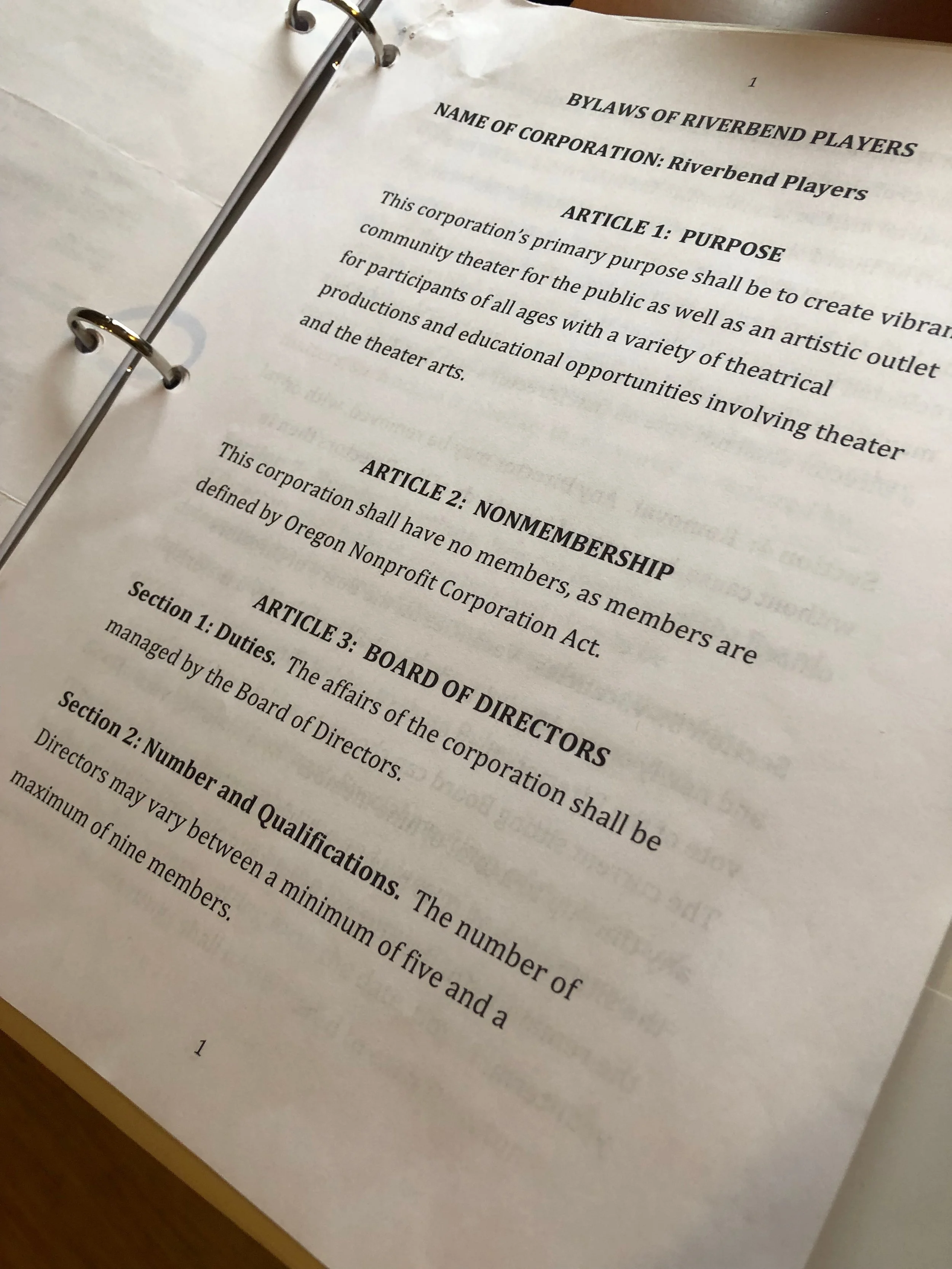Riverbend Players Non-Profit By-Laws
NAME OF CORPORATION: Riverbend Players
ARTICLE 1: PURPOSE
This corporation’s primary purpose shall be to create vibrant community theater for the public as well as an artistic outlet for participants of all ages with a variety of theatrical productions and educational opportunities involving theater and the theater arts.
ARTICLE 2: NONMEMBERSHIP
This corporation shall have no members
ARTICLE 3: BOARD OF DIRECTORS
Section 1: Duties. The affairs of the corporation shall be managed by the Board of Directors.
Section 2: Number and Qualifications. The number of Directors may vary between a minimum of five and a maximum of nine members.
Section 3: Term and Election. Except for the initial adjustments of shorter terms needed in order to create staggered terms, the term of office for Directors shall be two years. The Board shall make provisions to stagger the terms of Directors so that each year, the terms of as close as possible to one-half of the Directors shall expire. A Director may be reelected without limitation on the number of terms he or she may serve. The Board shall elect its own Directors except that a Director shall not vote on that Director’s own position.
Section 4: Removal. Any Director may be removed, with or without cause, by a vote of two-thirds of the Directors then in office.
Section 5: Vacancies. Vacancies on the Board of Directors and newly created Board positions shall be filled by a majority vote of the Directors then on the Board of Directors.
The current sitting Board can choose to add a new member at any time up to a total of nine members by a majority vote of the sitting Board. The new member’s first term will consist of the remainder of the current fiscal year plus an additional two year term.
Section 6: Quorum and Action. A quorum at a Board meeting shall be a majority of the number of Directors in office immediately before the meeting begins. If a quorum is present, action is taken by a majority vote of the Directors present, except as otherwise provided by these Bylaws.
Where the law requires a majority vote of the Directors in office to establish committees to exercise Board functions, to amend the Articles of Incorporation, to sell assets not in the regular course of business, to merge, or to dissolve, or for other matters, such action is taken by that majority as required by law.
Section 7: Regular Meetings. Regular meetings of the Board of Directors shall be held at the time and place to be determined by the Board of Directors. No other notice of the date, time, place, or purpose of these meetings is required., except as otherwise provided in these Bylaws.
Section 8: Special Meetings. Special meetings of the Board of Directors shall be held at the time and place to be determined by the Board of Directors. Notice of such meetings, setting forth the date, time, place, and purpose of the meetings shall be delivered to each Director either in person, by telephone, or by mail not less than two days prior to the special meeting. Written notice, if mailed to the last known address of the Director, is effective when mailed. It is the responsibility of each individual Director to keep the Board advised of current contact information.
Section 9: Meeting by Telecommunication or Computer.
Any regular or special meeting of the Board of Directors may be held by telephone, telecommunications, or electronic means, provided that all Directors can hear or read each other’s communications during the meeting or all communications during the meeting are immediately transmitted to each participating Director, and each participating Director is able to immediately send messages to all other participating Directors. All participating Directors shall be informed that a meeting is taking place at which official business may be transacted.
Section 10: Action by Consent. Any action required or permitted by law to be taken at a meeting of the Board may be taken without a meeting if consent in writing, setting forth the action to be taken, is signed by all the Directors. A written communication includes a communication that is transmitted or received by electronic means. Signing includes an electronic signature that is executed or adopted by a Director with the intent to sign.
ARTICLE IV: COMMITTEES
Section 1: Executive Committee. The Board President and Board Treasurer will comprise the Executive Committee. The Executive Committee shall have the authority to make on-going decisions between Board meetings and shall have authority to make financial and budgetary decisions. Spending for productions and other Board business may take place in an amount of $100 or less per transaction with a maximum of three transactions per month with the approval of the Executive Committee and without prior approval by the Board of Directors. All such transactions will be reported to the Board of Directors at the next Board meeting.
Section 2: Other Committees. The Board of Directors may establish such other committees as it deems necessary and desirable. Such committees may exercise the authority of the Board of Directors or may be advisory committees.
a. Play Selection Committee: This committee will consist of an Artistic Director elected by the Board of Directors and from one to four other individuals. Members of the committee will be selected by the Artistic Director and approved by the board. The selected productions will be brought to the Board of Directors for final approval by a majority of the Board members present at the regular board meeting.
b. Budget Committee: This committee will consist of the President, Treasurer, and another appointed Board Member. The Treasurer will chair this committee. A budget will be prepared in advance of the fiscal year beginning July 1st and presented to the Board of Directors for approval by a majority vote of all Directors in office at that time.
c. Marketing Committee: This committee will be chaired by the Secretary of the board and 2 to 3 other individuals selected by the Board of Directors who can be other Board members or members of the community at large. A marketing strategy will be presented during the fiscal year and approved by the board. The committee will be responsible for all marketing and communications for the organization and for the promotion of performances.
Section 3: Composition of Committees exercising Board Authority. Any committee that exercises any authority of the Board of Directors shall be composed of two or more Directors, elected by a majority vote of all Directors in office at that time.
Section 4: Quorum and Actions. A quorum at a Committee meeting exercising Board authority shall be a majority of all Committee members in office immediately before the meeting begins. If a quorum is present, action is taken by a majority vote of Directors present.
Section 5: Limitations on the Powers of Committees. No committee may authorize payment of a dividend or any part of the income or profits of the corporation to its directors or officers, may approve dissolution, merger, or the sale, pledge, or transfer of all or substantially all of the corporation’s assets, may elect, appoint, or remove directors or fill vacancies on the Board or on any of its committees, nor may adopt, amend, or repeal the Articles, Bylaws, or any resolution by the Board of Directors.
ARTICLE V: OFFICERS
Section 1: Titles and Qualifications. The officers of this corporation shall be the President, Vice-President, Secretary, Treasurer, and Artistic Director. All officers of this corporation must be members of the Board of Directors.
Section 2: Election. The Board of Directors shall elect the officers to serve one-year terms. An officer may be reelected without limitation on the number of terms the officer may serve. The officer must be elected by a majority vote of the sitting board members at the time of the election.
Section 3: Vacancy. A vacancy in any office shall be filled not later than the first regular meeting of the Board of Directors following the vacancy. If it is not possible to fill a vacancy at the first regular meeting, efforts will be made to fill the vacancies as soon as possible.
Section 4: Other Officers. The Board of Directors may elect or appoint other officers, agents, and employees as it shall deem necessary and desirable. They shall old their offices for such terms and have such authority and perform such duties as shall be determined by the Board of Directors.
Section 5: President. The President shall be the chief officer of the corporation and shall act as President of the Board. The President shall have any other powers and duties as may be prescribed by the Board of Directors.
Section 6. Vice President. The Vice President shall perform the duties of the President in his absence.
Section 7. Secretary. The Secretary shall have overall responsibility for all recordkeeping. The Secretary shall perform, or cause to be performed, the following duties: (a) official recording of the minutes of all proceedings of the Board of Directors meetings and actions; (b) provision for notice of all meetings of the Board of Directors; (c) authentication of the record of the corporation; and (d) any other duties as many be prescribed by the Board of Directors.
Section 8. Treasurer. The Treasurer shall have the overall responsibility for all corporate funds. The Treasurer shall perform, or cause to be performed, the following duties: (a) maintenance of full and accurate accounts of all financial records of the corporation; (b) deposit of all monies and other valuable effects in the name and to the credit of the corporation in such depositories as may be designated by the Board of Directors; (c) disbursement of all funds when proper to do so; (d)presentation of financial reports as to the financial condition for the corporation to the Board of Director’s,; and (e) any other duties as may be prescribed by the Board of Directors.
Section 9. Artistic Director. The Board of Directors shall elect an officer to act as Artistic Director. The Artistic Director will work with the Play Selection Committee, maintain a list of available Directors, and recommend Directors for performances to the Board of Directors for approval. The play selection committee will develop a list of possible directors and recommend them for each play. The Artistic Director will contact possible directors for upcoming plays and select one per play. The board will have final approval for director choices. Directors who approach the board with a play he/she wants to direct will also be considered for upcoming plays. The Artistic Director is responsible for the overall quality of Riverbend Players productions.
ARTICLE VI: CORPORATE INDEMNITY
This corporation will indemnify to the fullest extent not prohibited by law any person who is made, or threatened to be made, a party to an action, suit, or other proceeding, by reason of the fact that the person is or was a Director, officer, employee, volunteer, or agent of the corporation or fiduciary within the meaning of the Employee Retirement income Security Act of 1974 (or its corresponding, future provisions) with respect to any employee benefit plan of the corporation. No amendment to the Article that limits the corporation’s obligation to indemnify any person shall have any effect on such obligation for any act or omission that occurs prior to the later of the effective date of the amendment or the date notice of the amendment is given to the person. The corporation shall interpret this indemnification provision to extend to all persons covered by its provisions the most liberal possible indemnification—substantively, procedurally, and otherwise.
ARTICLE VII: AMENDMENT TO THE BYLAWS
These Bylaws may be amended or repealed, and new Bylaws adopted, by the Board of Directors by a majority vote of Directors present, if a quorum is present. Prior to the adoption of the amendment, each Director shall be given at least two days notice of the date, time, and place of the meeting at which the proposed amendment is to be considered, and the notice shall state that one of the purposes of the meeting is to consider a proposed amendment to the Bylaws and shall contain a copy of the proposed amendment.
Addendum I – Choosing a Director (12/2018)
A play selection committee will develop a list of possible directors and recommend Directors for the plays selected. The Artistic Director will contact possible Directors for upcoming plays and submit to the board for final approval. Directors who contact board members will also be considered for upcoming plays. The Board will have final approval of a director for any production.
Addendum II – Choosing a Producer (12/2018)
The Director will choose a Producer. The Director, in partnership with the Producer, will write a production plan and develop a line-item budget to present to the Board for approval. The Producer will manage the budget and promotion of the play, and the Producer will communicate production needs to the Board. The Board has final say over budget approval.


